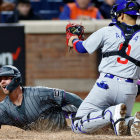
One of the biggest points of contention during the collective bargaining negotiations between Major League Baseball and the MLB Players Association entailed how to proceed with the Competitive Balance Tax. The CBT was first implemented as a luxury tax aimed at curbing breakaway spending. In recent years, teams have treated it as an unofficial salary cap, with few daring to cross so much as the lowest threshold.
The players, understandably, sought higher thresholds throughout the life of the new Collective Bargaining Agreement; if teams weren't willing to go over the line, fine, but at least push the line further out. The owners, for their part, wanted to disincentive teams from blowing by the tax lines -- and yes, 29 of them might have been thinking of Mets head honcho Steve Cohen throughout the process. Both sides got their wishes.
The CBT line for this upcoming season is $230 million, or $20 million higher than it was last year. Additionally, there is a new tax tier that will put the screws to any owner willing to leverage their financial might. Here's a look at the tiers and the tax rates for first-time payors. (The penalties are steeper for multiple-time offenders.)
| Tax tier | Threshold | Tax rate |
|---|---|---|
First | $230 million | 20% |
Second* | $250 million | 32% |
Third | $270 million | 62.5% |
Fourth | $290 million | 80% |
*Teams who exceed at least the second threshold will also have their top draft pick moved down 10 spots, with the exception for clubs who are slated to pick within the top six. Those teams would have their second-highest pick bumped back.
What does all this mean for your favorite team? Below, we've broken down the tax situations of baseball's six highest spenders -- the Mets, Dodgers, Yankees, Padres, White Sox, and Red Sox -- by answering questions, like, how much they've spent to date; what thresholds they've passed; and what kind of penalties are they facing?
Crunching tax numbers isn't exactly anyone's idea of a good time, but it could go a long way in determining what these teams do -- and don't do -- the rest of the offseason. Now, let's get to it. (Do note that all data used in this article comes from either Spotrac or Cot's Contracts.)

CBS Sports HQ Newsletter
Your Ultimate Guide to Every Day in Sports
We bring sports news that matters to your inbox, to help you stay informed and get a winning edge.
Thanks for signing up!
Keep an eye on your inbox.
Sorry!
There was an error processing your subscription.
Well over the tax line
Mets: $278 million tax payroll; third surcharge tie
Again, the other owners were likely thinking of Cohen when they crafted the new tax structure. He isn't waiting to test the limits, either. The Mets are already nearly $50 million over the line, and Cohen suggested on Sunday that they'll "probably" soar into the highest surcharge level (aka the Steve Cohen tax), which begins at $60 million over. What do the Mets get in exchange? Well, a better ballclub, to begin with. They'll also have to pay a tax bill of more than $15 million, and they'll have their top draft pick in 2023 docked. Those are trifling penalties if the spending results in a World Series championship.
Dodgers: $251 million tax payroll; second surcharge tier
The Dodgers aren't accustomed to finishing second in spending, let alone to this degree. Put another way, the Dodgers are closer to the tax line (more than $20 million beyond) than they are to the Mets' CBT number. Andrew Friedman and rookie general manager Brandon Gomes have been big-game hunting lately, with the rumor mill connecting them to free-agent first baseman Freddie Freeman. Even if they come up short there, it stands to reason they'll drop more coin between now and Opening Day, and then again prior to the trade deadline. As such, it's difficult to see a scenario where the Dodgers finish below at least the second surcharge level. For now, the Dodgers' tax bill would be around $6 million given that they are repeat offenders.
Over the tax line
Yankees: $235 million tax payroll; first surcharge tie
Sunday's acquisition of Josh Donaldson -- or, more specifically, Josh Donaldson's hefty tax number ($23 million) -- put the Yankees over the line by more than $5 million. The Yankees haven't crossed the threshold in two of the past three seasons where the tax applied (it was suspended for 2020), so this is a less common occurrence than you might expect given who we're talking about. The Yankees' current tax bill would be around $1 million, a laughable figure that should encourage New York to continue spending. The real question is now whether Brian Cashman and company are willing to have their draft pick docked by 10 spots. They might not have a choice if their goal is to remain competitive in the American League East.
Under the tax line, for now
Padres: $210 million tax payroll
The Padres have about $20 million separating themselves from the tax threshold after paying an overage penalty of around $1.3 million last winter. Despite A.J. Preller's wheeling and dealing reputation, it's reasonable to expect them to duck back under the line for this season. The Padres could create more space for themselves by finding a taker for either Eric Hosmer ($18 million in CBT dollars) or Wil Myers (around $14 million). Sources told CBS Sports that San Diego has been willing to attach a quality prospect, perhaps even 2020's first-round pick Robert Hassell, to move money.
White Sox: $209 million tax payroll
Much like the Padres, the White Sox also have just over $20 million sparing them from the tax line. Much like Preller, Rick Hahn too could look to create additional wiggle room by finding a taker for reliever Craig Kimbrel ($16 million for tax purposes). Hahn's offseason suggests he's confident he can do just that. In addition to exercising Kimbrel's club option after his shaky performance down the stretch, he's also signed a pair of relievers to multi-year deals: first Kendall Graveman, and now Joe Kelly. The White Sox have never crossed the CBT in their history. We're guessing that stays true.
Red Sox: $208 million tax payroll
The Red Sox have added more than $30 million in tax dollars this offseason by trading for Jackie Bradley Jr. and signing James Paxton, Michael Wacha, and Rich Hill. Chaim Bloom has about $20 million more in breathing room, but the Red Sox seem like a prime candidate to exceed the tax this season before ducking underneath it again next year. That's because Boston has several big contracts that will expire at season's end, including those that bind J.D. Martinez and Nathan Eovaldi. The Red Sox paid more than $10 million in tax fees in each of the 2019 and 2018 seasons. They won a World Series during that time, so they should deem it as money well spent.






















